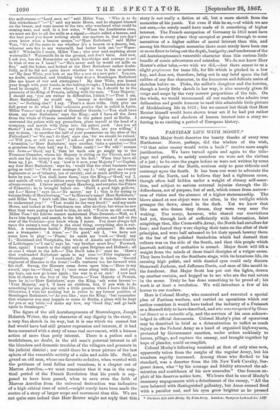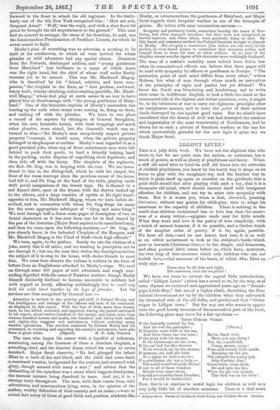PARTIZAN LIFE WITH MOSBY.*
WE think Major Scott deserves the hearty thanks of every true Northerner. Never, perhaps, did the wisdom of the wish, "0 that mine enemy would write a book !" receive more ample justification. We have turned again and again to the title- page and preface, to satisfy ourselves we were not the victims of a jest ; to be sure the pages before us were not written by some bitter advocate of the North, anxious only to poufridicule and contempt upon the South. It has been our wont to advocate the cause of the North, and to believe they had a righteous cause, though often half hidden under a weight of clumsy self-asser- tion, and subject to serious external injuries through the ill- definedness, not of purpose, but of end, which comes from narrow- ness of vision and the absence of a higher statesmanship. The blows aimed at one object were too often, in the twilight which presages the dawn, aimed in the dark. Yet we knew that like men who dream they dream, they were very near the waking. Too many, however, who shared our convictions had yet, through lack of sufficiently wide information, faint misgivings that, like Cromwell's Army, the North had cavaliers for foes ; and feared they were slaying their taste on the altar of their principles, and were half ashamed to let their speech bewray them at the bar of the polished Sanhedrim which had decreed that culture was on the side of the South, and that this people which knoweth nothing of msthetics is cursed. Major Scott will lift a weight from the minds of these timid disciples of a vulgar cause. They have looked on the Southern stage, with its luxurious life, its seeming high polish, and with dazzled eyes could only discern Stonewall Jackson, and Jefferson Davis, and men of like mould in the forefront. But Major Scott has put out the lights, drawn up another curtain, and begged us to see who are the real actors in the scene. Truly he has done something to be proud of ; his work is at least a revelation. We will introduce a few of his heroes to our readers.
Here is Colonel Mosby, who conceived and executed a special plan of Partizan warfare, and carried on operations which our author considers it would have tasked the industry of a Froissart or a Boswell fitly to have described, and who was recognized by Gene- ral Stuart as a valuable ally, and the services of his men acknow- ledged in official documents. Colonel Mosby's plan of operations may be described in brief as a determination to inflict as much. injury on the Federal Army as a band of organized highwaymen, protected by Government sanction, under orders recklessly to harass, pillage, and capture the ememy, and brought together by hope of plunder, could accomplish.
Colonel Mosby's following consisted at first of only nine men, apparently taken from the roughs of the regular Army, but his numbers rapidly increased. Among those who flocked to his standard, was a deserter from the 5th New York Cavalry, Ser- geant Ames, who "by his courage and fidelity attracted the ad- miration and confidence of his new comrades." One famous ex- ploit of his deserves notice here. We learn that in one of Mosby's summary engagements with a detachment of the enemy, "All the men behaved with distinguished gallantry, but Ames seemed fired with a peculiar zeal, and his eyes grew brighter as he pressed
Partizan Life with Moab,. By John 8034. London: 8ampana Lowaud Co. 1861
forward in the front to attack his old regiment. In the hurly- burly one of the 5th New York recognized him : How are you, Sergeant Ames?' 'Well,' was the reply, and with a shot from his pistol he brought his old acquaintance to the ground." This man had no quarrel to revenge, the cause of his desertion, he said, was the Emancipation Proclamation of President Lincoln, for which he never meant to fight.
Mosby's plan of recruiting was to advertise a meeting to be held at his rendezvous, to which all were invited for whom
plunder or wild adventure had any special charm. Deserters from the Federals, discharged soldiers, and "young gentlemen from Maryland" lent brilliance to a corps of which Ames was the right hand, but the chief of whose staff under Mosby remains yet to be named. This was Mr. Blackwell Magog, who is described by his "Mend, relative, and boon com- panion," the chaplain to the force, as "that profane, awkward, heavy built, whisky-drinking, calico-stealing guerrilla, Mr. Black- well Magog," whose foul play at cards seems in no way to have placed him at disadvantage with "the young gentlemen of Mary- land." One of the favourite exploits of Mosby's marauders was tearing up the rails when trains were coming in, firing on them, and making off with the plunder. We have in one place a record of the capture by stratagem of General Stoughton, when his own favourite horses, with their trappings and much other plunder, were sMzed, but the General's watch was re- turned to him—"for Mosby's men scrupulously respect private property "—except, it would seem, when the private property belonged to shopkeepers or antlers. Mosby's men regarded it as a good practical joke, when any of these unfortunate men were left behind to pack their goods, to lend a friendly helping hand in the packing, under disguise of expediting their departure, and then ride off with the booty. The chaplain of the regiment, the Rev. Dr. Gog, was in keeping with the rest. We are intro- duced to him in the dining-hall, which he calls his chapel, the floor of the room unswept since the previous owner of the house had left it, and Dr. Gog, at the head of the table, playing cards with jovial companions of the lowest type. He is dressed in a red flannel shirt, open at the breast, with the sleeves tucked up to the elbows, and a large tumbler of spirits at his right hand ; opposite to him, Mr. Blackwell Magog, whom we have before de- scribed, and in connection with whom Dr. Gog drops his name for the more appropriate sobriquet of "Grog and more Grog." We read through half a dozen more pages of description of two as brutal characters as it has ever been our lot to find traced by the pen of the historian (Major Scott aspires to be considered one), and then we come upon the following sentence :—" Dr. Gog, as you already know, is the inducted Chaplain of the Rangers, and Mr. Blackwell Magog is the 'Chief of Staff—both high officials:" We turn, again, to the preface. Surely we are the victims of a joke, surely this is all satire, and we wanting in perception not to zee through it ; but no, the man that writes the description invites
the subject of it to stay in his house, with choice friends to meet .him. We must here observe the volume is written in the form of letters from an Englishman attached to Mosby's corps. We read
on through some 400 pages of wild adventure and rough mar- auding dignified with the name of Partizan warfare, though Mosby himself distinctly declined to become amenable to military law with regard to booty, affirming unblushingly that he could only 'told his noble band together by the hope of plunder. Yet his services are thus recognized by General Lee :-
Attention is invited to the activity and skill of Colonel Mosby, and -the intelligence and courage of the officers and men of his command, as displayed in this report. With the loss of little more than twenty men, he has killed, wounded, and captured, during the period embraced in his report, about twelve hundred of the enemy, and taken more than -sixteen hundred horses and mules, two hundred and thirty beef cattle, and eighty-five waggons and ambulances, without counting many smaller operations. The services rendered by Colonel Mosby and his .command, in watching and reporting the enemy's movements, have also
-been of great value. (Signed) R. E. LEE, GeneraL
The man who began his career with a handful of followers, .numbering among the foremost of them a drunken chaplain, a ,swindling chief, and the deserter Ames, raised his corps to seven hundred. Major Scott observes, "lie had plunged the infant Mars in a bath of fire and blood, and the child had come forth renowned warrior, invigorated for the contest, and crowned with glory, though seamed with many a scar ;" and relates that the disbanding of the squadron was a scene which beggars description, - the sternest natures being dissolved in tears. And yet, it is a strange story throughout. The men, with their coarse lives, wild adventures, and unscrupulous lying, were, in the opinion of the .author, worthy defenders of their country and its cause ;—were in actual fact many of them of good birth and position, students like
Mosby, or volunteers from the gentlemen of Maryland, and Major Scott regards their irregular warfare as one of the triumphs of genius. He writes with most unconscious sarcasm :—
Irregular and predatory bands, sometimes bearing the name of Par- tizans, had often annoyed invaders ; but they were not recognized as lawful warriors, and, when taken, wore generally hung or shot. By this harsh and summary method the Federal Generals thought to dispose of Mosby. But carrying a conunission [the italics are our own] in his pocket, he soon found means to counteract that ferocious policy, and compel them to treat his men as other soldiers. In no part of his singular career was the vigour of his character more strikingly displayed.
The tone of a nation's morality must indeed have fallen low when its commissioned officers can believe that these pages will
be read with sympathy by officers or gentlemen in Europe. "The saturation point of each mind differs from every other," writes Holmes, but what of men through whose minds no perception of the principles of right and justice has yet filtered? We knew the North was blundering and headstrong, apt to write clear sense in indifferent English, to look a little too much at the commercial side of the highest and widest questions, even, it might be, in the bitterness of war to carry out righteous principles after an unrighteous manner, and to have the polish of their noblest deeds destroyed by sins against good taste. But we should have considered that the demon of civil war had destroyed the candour and impartiality of the most trustworthy of Northerners, had he drawn for us such a picture of Southern warfare as the one for which (sorrowfully grateful for the new light it gives us) we thank Major Scott.































 Previous page
Previous page